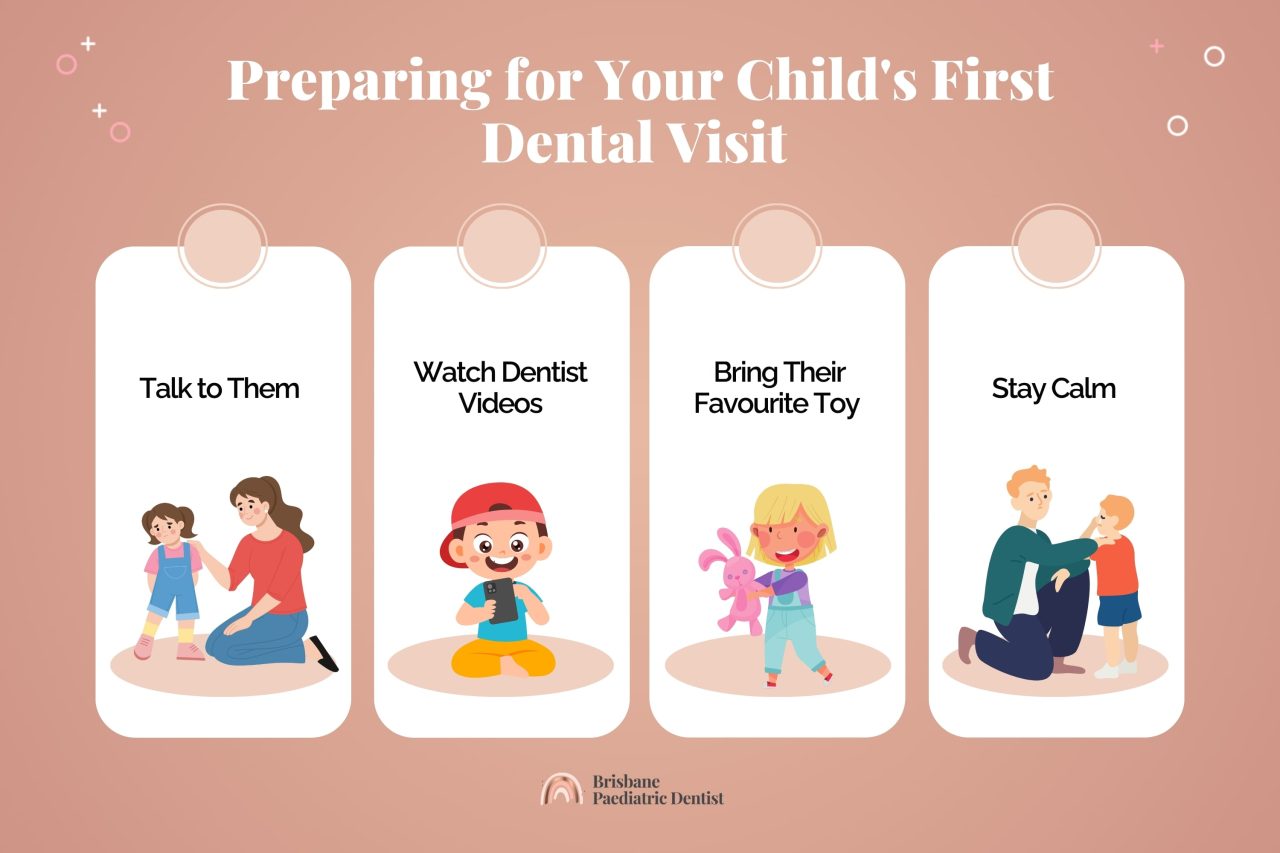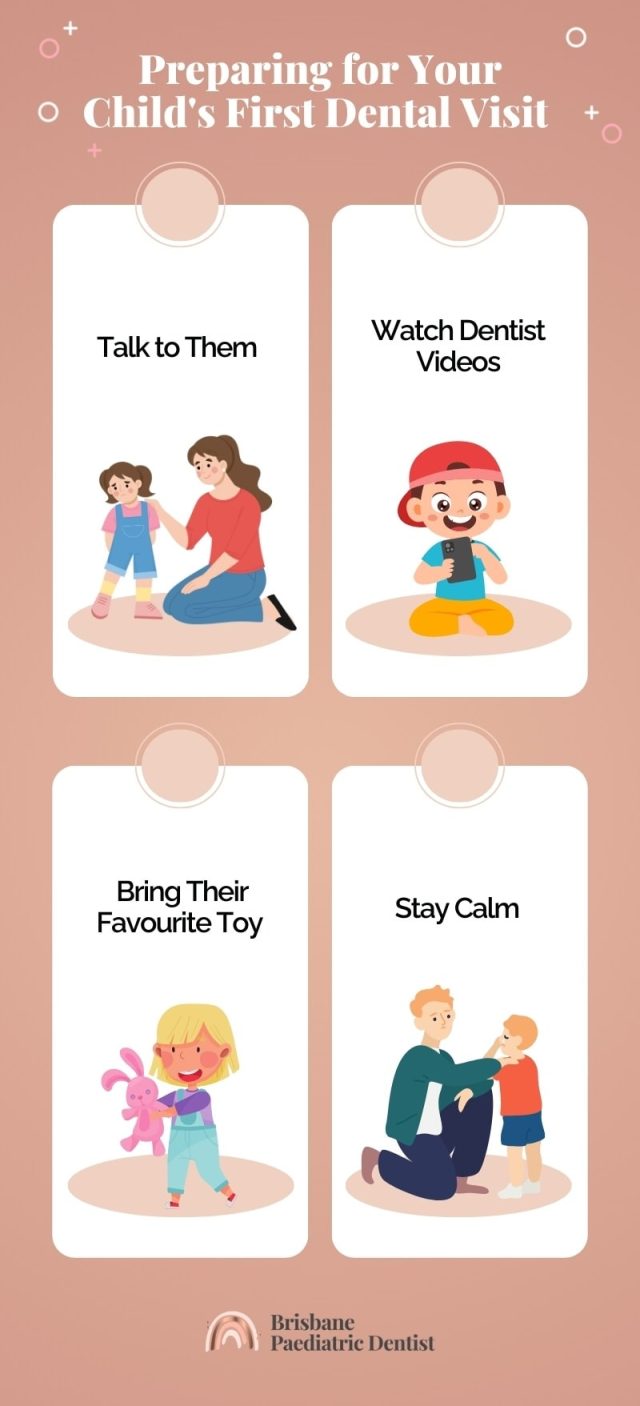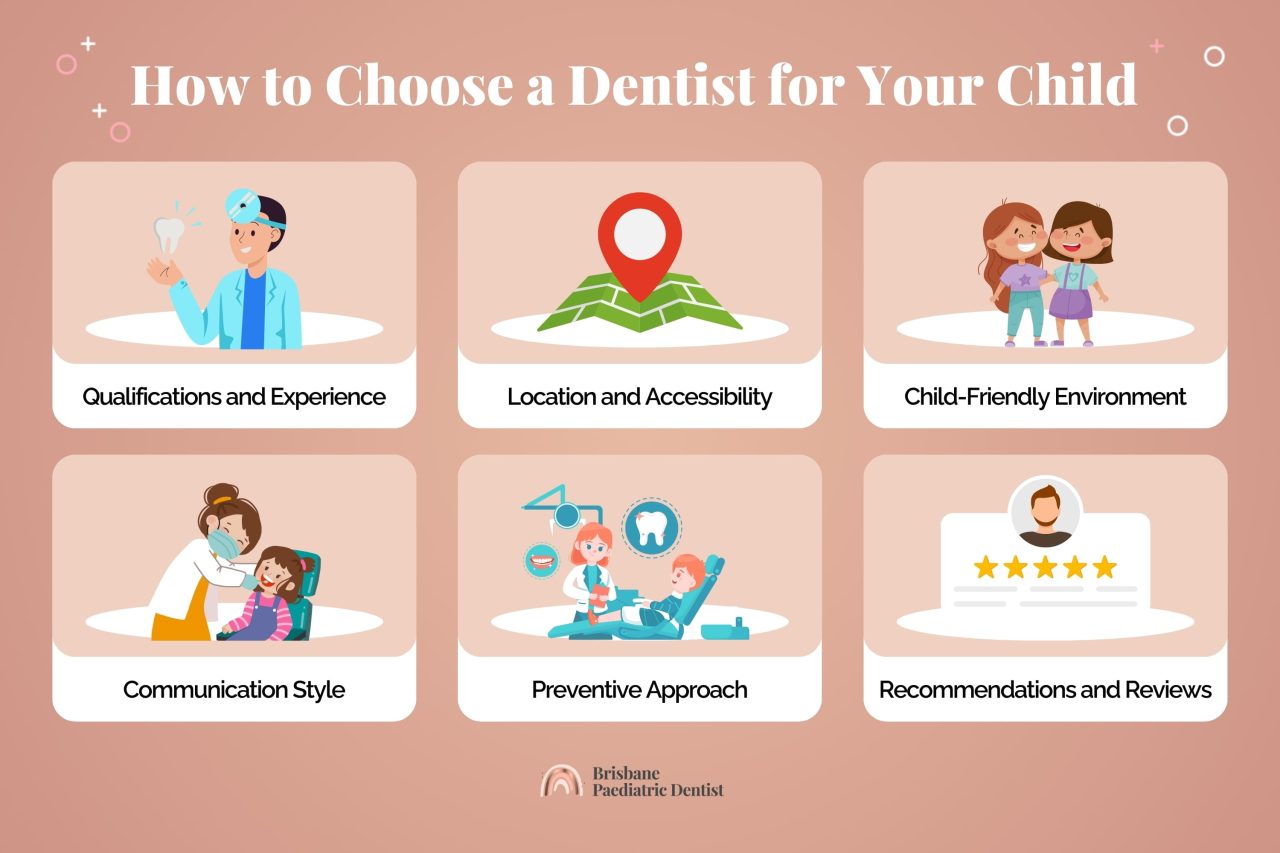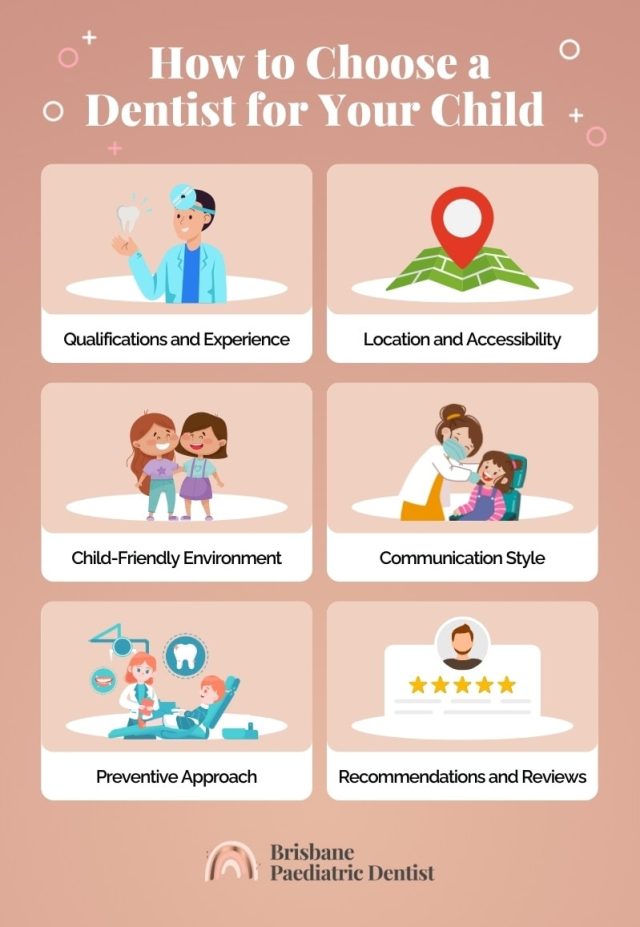Your child’s first dental visit is a big milestone, but it’s one that can cause anxiety for both the children and the parents! Here’s Brisbane Paediatric Dentist’s guide, from knowing the best age for their first dental check-up to how to make the visit easier for them (and yourself!).
First Dental Visit Age
The Australian Dental Association (ADA) recommends that a child’s first dental visit should happen by their first birthday or within six months of their first tooth appearing. Early dental visits help set a foundation for healthy oral habits and prevent dental issues as your child grows up.
Signs Your Child Should see a Dentist Sooner
While the recommended age for the first dental visit is around one year, there are specific signs that might show a need for an earlier appointment. If your child shows signs of tooth pain, sensitivity, or has visible cavities, it’s important to see a dentist immediately.
Other signs include swollen or bleeding gums, thumb sucking or pacifier use beyond the age of two, and any abnormal oral development. Early intervention can prevent more severe dental issues and establish a positive relationship with dental care. Consultant Brisbane Paediatric Dentist if you have any concerns about your child’s oral health.
Importance of Early Dental Visits
Why should you get your child used to going to the paediatric dentist from an early age? Here’s why taking care of your child’s oral health when they’re a baby is so important.
Establishing a “Dental Home”
Create a consistent and comfortable relationship between a child and their dentist, starting at an early age. This helps your child to feel at home and reduces the chances of them developing dental anxiety or fear around dental treatment.
Developmental Benefits
Regular check-ups help dentists to identify and treat potential issues like tooth decay, misalignment, or bite problems before they become severe. Early intervention can guide proper dental development, making sure that primary teeth grow in healthy and pave the way for permanent teeth.
Healthy baby teeth also help your child to develop clear speech. Aside from physical development, early dental care will help your child establish good habits from an early age.
What to Expect at Your Child’s First Dental Visit
When you take your child to the dentist for the first time, the process is quite predictable. Here’s what you can expect.
Initial Examination
The paediatric dentist will start with a gentle examination of your child’s teeth, gums, and mouth. This initial check-up will identify any early signs of tooth decay or other dental issues. The dentist may also count your child’s teeth to make sure they’re developing correctly for their age. This part of the visit is usually quick and easy, helping to build your child’s comfort and confidence in the dental environment.
Dental Cleaning and Preventive Care
Following the initial examination, the dentist or dental hygienist will perform a thorough cleaning of your child’s teeth. This cleaning involves removing any plaque or tartar build-up that can lead to cavities and gum disease. They may apply fluoride treatment to strengthen the teeth and provide extra protection against decay.
Addressing any Dental Concerns
If the dentist spots any dental concerns, they’ll discuss these with you in detail. This discussion may include issues like cavities, misalignment, or habits such as thumb sucking.
The dentist will give you advice on how to manage these concerns and may suggest further treatments if necessary. This is also a great opportunity for you to ask any questions about your child’s oral health and get professional guidance on maintaining a healthy dental routine at home.
Preparing for the First Dental Visit


Do what you can to ease stress on the day of your child’s first dentist visit. A good first visit will set them up for life!
Talking to Your Child About the Dentist
Prepare your child for their visit to the dental clinic by talking to them about it. This will help you figure out if they have fear about the dentist, and you can help ease it. If your child is around one year of age, they may not understand you, but if they’re slightly older, this is a great idea.
Use simple, positive language and explain that the dentist will look at their teeth to make sure they’re healthy. You could read books or watch videos about visiting the dentist together. Avoid using words like “hurt” or “pain” and focus on the benefits, like having strong, shiny teeth.
What to Bring to the Appointment
Bring any necessary medical information and forms that the dentist might need. It’s also a good idea to bring your child’s favourite toy or comfort item to help them feel more relaxed.
If your child has a specific dental concern or previous medical conditions, make a note of these to discuss with the dentist. Don’t forget your Medicare card and private health insurance details, if applicable.
Preparing Yourself as a Parent
As a parent, it’s important to stay calm and positive. Children can pick up on your anxiety, so try to remain cheerful and reassuring. Prepare any questions you might have about your child’s dental health beforehand.
Familiarise yourself with the dental office’s location and parking arrangements to reduce stress on the day. Plan to arrive a little early to fill out any paperwork and settle in.
Choosing a Dentist for Your Child
General Dentists vs. Paediatric Dentists
General dentists are trained to treat patients of all ages, providing routine dental care like cleanings, fillings, and check-ups. They can manage basic dental issues and offer guidance on oral hygiene practices.
Paediatric dentists, on the other hand, undergo special training focused on the dental needs of children. This includes child psychology, growth and development, and specialised techniques for treating young patients.
They’re skilled in managing dental fears and behaviour, making the experience more comfortable for children. Paediatric dentists are also adept at handling specific childhood dental issues, like early tooth decay and developmental concerns.
Factors to Consider


When choosing a dentist for your child, consider the following factors:
- Qualifications and Experience: Make sure the dentist has the necessary qualifications and experience in treating children. Look for a dentist who has completed additional training in paediatric dentistry.
- Location and Accessibility: Choose a dentist whose practice is conveniently located. This makes it easier to attend regular appointments and handle any dental emergencies.
- Child-Friendly Environment: A dental office that’s welcoming and child-friendly can make a big difference in your child’s comfort level. Look for an office with a playful atmosphere, toys, and activities to keep children engaged.
- Communication Style: The dentist should be able to explain procedures in a way that’s easy for your child to understand and make your child feel at ease throughout the visit.
- Preventive Approach: Opt for a dentist who emphasises preventive care and education. They should provide guidance on good oral hygiene practices and dietary habits that promote dental health.
- Recommendations and Reviews: Seek recommendations from other parents and read online reviews to get an idea of the dentist’s reputation and the experiences of other families.
Frequency of Dental Visits
Regular dental visits are important for maintaining good oral health in children. Dentists recommend that children should have their first dental visit by their first birthday or within six months of their first tooth appearing.
After this initial visit, it’s advised that children see the dentist every six months. These routine check-ups help prevent cavities, monitor the development of teeth, and establish good oral hygiene habits early in life.
Promoting Good Oral Health Habits
Teaching the Basics of Brushing and Flossing
Start by choosing a soft-bristled toothbrush suitable for their age and a fluoride toothpaste. Encourage them to brush twice daily, for at least two minutes each time. Use a gentle circular motion, covering all surfaces of the teeth and gum line.
Flossing should begin when teeth touch each other, usually around age two or three. Show them how to use a short length of floss to clean between each tooth, gently curving the floss around the base of each tooth.
Importance of a Healthy Diet
Foods high in sugar and starch can contribute to tooth decay and gum disease. Encourage a balanced diet rich in fruits, vegetables, lean proteins, and whole grains. Dairy products like milk, cheese, and yoghurt are excellent sources of calcium, which strengthens teeth.
Drinking plenty of water, especially fluoridated tap water, helps wash away food particles and bacteria. Limiting sugary snacks and beverages, including fruit juices, is important for preventing cavities and promoting overall dental health.
Monitoring for Signs of Dental Issues at Home
Regularly checking for signs of dental problems can help catch issues early. Look for changes in the colour or texture of teeth, like white spots, which can indicate the start of decay, or blackness, which could be a dead or dying tooth. Gums should be pink and firm, not red, swollen, or bleeding.
Bad breath that doesn’t go away with brushing and flossing could signal an underlying problem. If your child complains of tooth pain or sensitivity to hot or cold, see a dentist as soon as possible. Keeping a close eye on their oral health helps ensure any issues are addressed quickly and effectively.
Child’s First Dental Visit FAQs
Can I be in the room with my child during their Dental Visit?
Yes, most paediatric dental offices encourage parents to stay with their child during the visit. This can help your child feel more secure and reduce anxiety. Discuss this with your dentist beforehand to understand their specific policies and how you can best support your child during the appointment.
Are Dental X-Rays safe for young children?
Yes, dental X-rays are safe for young children. Dentists take special precautions to minimise exposure to radiation, such as using lead aprons and high-speed film. X-rays are important for detecting dental issues that are not visible during a regular examination, such as cavities between teeth or problems with the developing teeth and jaw.
If you liked this, you might also be interested in Dental Pulpectomy for Primary Teeth and When Do Baby Teeth Fall Out?
Back to Top: Child’s First Dental Visit





